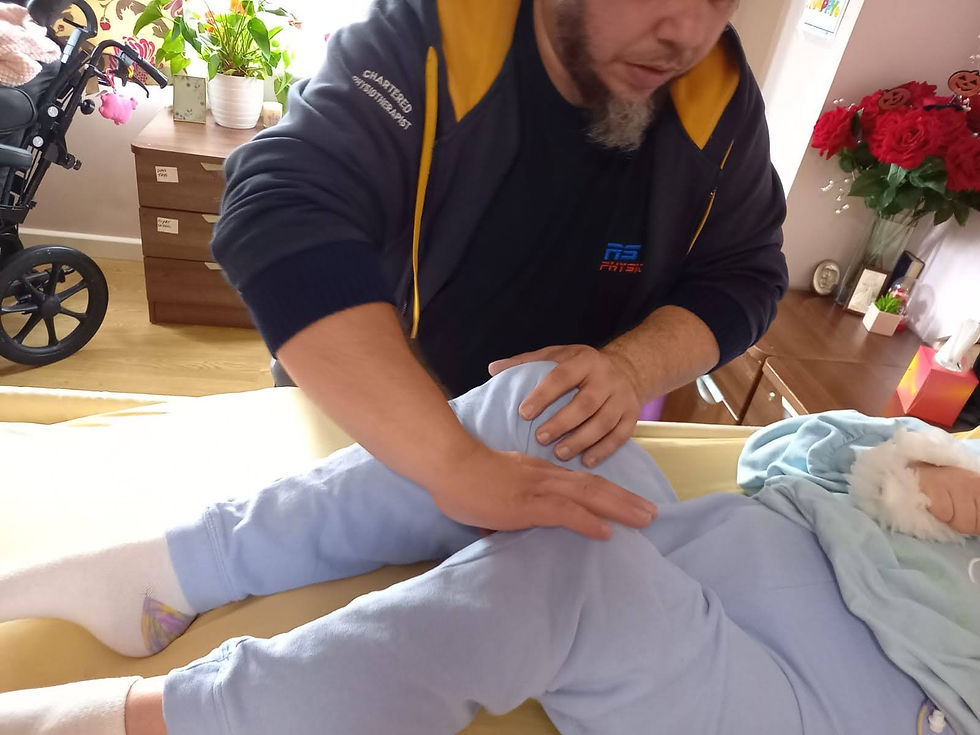Hearts in Sync: The Dance of Heart Problems and Multiple Sclerosis (MS)
- Pawel Ciecierski MSc Physiotherapy MCSP HCPCreg

- Jun 6, 2023
- 4 min read

Did you know that people with Multiple Sclerosis (MS) often have heart problems? It's like solving a puzzle to understand this connection, but don't worry, we're here to break it down for you with a touch of humor.
The Numbers Game:
Imagine a group of researchers studying the data to find out how common heart problems are in people with MS. They found that the prevalence of coronary artery disease (CAD) ranged from 19% to a whopping 42%. It all depended on how they defined the problem. That's quite a big difference, isn't it?
The Test Mystery:
To investigate further, the researchers used different tests to measure heart rate and see how the heart reacted in different situations. But here's the funny part—they didn't tell us which tests worked best together! More consistency is needed.
Heart Drama:
Heart problems can surprise people with MS during a relapse, but the good news is that treating the relapse can actually help the heart. It's like getting two benefits in one! However, heart issues can also gradually appear as MS gets worse. Sadly, we don't know if the treatments we have for MS can prevent these heart problems. More science is needed to make it clear. Ask your doctor to confirm this is not missed while testing.
The Search for Clarity:
When it comes to detecting heart problems in people with MS, there's no clear rulebook. It's like the Wild West out there! But researchers think that using a combination of different tests, like analyzing heart rate patterns. The researched article suggests it might be the best approach. However, they warn that some tests can be tricky and give misleading results. So, it's important to choose the right methods carefully, and hopefully, a conclusion and standard approach will be agreed soon.
The Mystery Deepens:
As we dig deeper into the link between MS and heart problems, we realize there are still many unanswered questions. Researchers have mainly focused on heart rate patterns, but there are other aspects of heart function that haven't been studied enough. It's like trying to solve a puzzle with missing pieces. Can we really find the answer without all the necessary information? It's a puzzle that still needs to be solved!
Blaming the Brain:
Now, let's explore the role of the brain in this MS and heart mystery. Some evidence suggests that brain lesions, especially in the brainstem, might be involved. But here's the twist—the data is conflicting, and we're not sure if there's a definite answer yet. There's evidence showing that the shrinkage of the spinal cord in MS is connected to coronary artery disease. Since spinal problems can affect MS-related disability, it makes researchers wonder if this is partly due to problems with the autonomic system ( in humans is responsible for controlling involuntary bodily functions, such as heart rate, digestion, and breathing).
Research suggests that CAD is more severe in patients with progressive MS compared to those with relapsing-remitting MS. Existing CAD seems to worsen over time as the disease progresses, although it can already be present at the time of diagnosis and get worse shortly afterward. There is also some evidence linking CAD with the severity of MS symptoms and disease activity. Fatigue is a common issue for people with MS, and many studies have looked into whether CAD plays a role in causing fatigue. However, the results are not clear and vary across different studies.
In the Context of Physiotherapy:
Doing tests to assess the heart's function in people with MS is important, but it comes with its challenges. It should be done by a specialist in a clinical setting. Doing these tests it's like trying to control a wild horse during a storm. One big challenge is that many factors can affect the results of these tests, and it's difficult to control them and maintain safety. For example, the level of disability can vary and training conditions can influence the outcome, even for people with similar levels of disability. If you're working on improving your physical health, remember to consider this information and talk to your doctor before starting any new physical activities.
So, dear readers, the story continues. Heart problems are more common in people with MS, but there's still a lot we don't understand. The puzzle of CAD (Cardiac Autonomic Dysfunction) in MS patients remains unsolved, but we're hopeful that future studies will bring us closer to understanding this complicated connection. The hearts and nerves of people with MS are connected, and researchers are working hard to put the puzzle pieces together. Hopefully, we'll have more answers and a clearer understanding of how to support individuals with MS and their hearts. For now, remember to prioritize safety during physical activity and exercise, consult your doctor beforehand, and pay attention to symptoms like dizziness and weakness while moving and exercising. AND KEEP MOVING.
Reference:
1. Findling O, Hauer L, Pezawas T, Rommer PS, Struhal W, Sellner J. Cardiac Autonomic Dysfunction in Multiple Sclerosis: A Systematic Review of Current Knowledge and Impact of Immunotherapies. J Clin Med. 2020 Jan 24;9(2):335. doi: 10.3390/jcm9020335. PMID: 31991711; PMCID: PMC7073977.





Comentarios